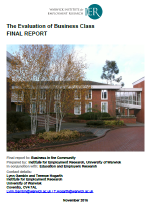IER News & blogs
IER Business Class Evaluation report published
 Business in the Community’s (BITC) Education campaign focusses on preventing social background predicting a young person's success at school and beyond. Business Class is an education programme run by BITC that offers a framework for schools and businesses to work together to address this goal. Business Class (BC) creates school - business partnerships that are designed to be long - term and driven by the needs of the school and the priorities, resources and capacity of the business. The programme focuses on schools that have above average numbers of pupils eligible for free school meals, are located in the most deprived areas of the country according to the Income Deprivation Affecting Children Index (IDACI) and/or are not achieving national average GCSE results. Partnerships undertake activities in four areas: leadership and governance, curriculum, enterprise and employability and wider issues. Within geographic areas , BC partnerships are grouped into clusters which are designed to encourage collaboration between diff erent schools and businesses, locally and across the country.
Business in the Community’s (BITC) Education campaign focusses on preventing social background predicting a young person's success at school and beyond. Business Class is an education programme run by BITC that offers a framework for schools and businesses to work together to address this goal. Business Class (BC) creates school - business partnerships that are designed to be long - term and driven by the needs of the school and the priorities, resources and capacity of the business. The programme focuses on schools that have above average numbers of pupils eligible for free school meals, are located in the most deprived areas of the country according to the Income Deprivation Affecting Children Index (IDACI) and/or are not achieving national average GCSE results. Partnerships undertake activities in four areas: leadership and governance, curriculum, enterprise and employability and wider issues. Within geographic areas , BC partnerships are grouped into clusters which are designed to encourage collaboration between diff erent schools and businesses, locally and across the country.
The main aim of the evaluation was to assess the impact of various employer - engagement activities upon the young people that participated in Business Class (BC) from 2013 to 2015. The intended impact of Business Class is to facilitate a smooth transition into employment and thus to reduce the numbers of young people who are, or are at risk, of becoming, NEET.
The aims of the evaluation were to:
- assess the impact of employer - engagement activities upon the young people that participated in BC between 2013 and 2015;
- identify the added - value that BC imparts on pupils, schools, and the employers involved ;
- evaluate the uplift of employability skills and impact on the likelihood to become NEET ; and
- capture the formative lessons that will improve both the effectiveness and efficiency with which BC is delivered.
The study's overall findings include:
- BC increased pupils’ access to information about employability. The fact that the information was delivered by employers, rather than teachers, reinforced the credibility of the information provided to pupils.
- Pupils were likely to experience two additional employability and enterprise activities as a result of BC compared with pupils not participating in BC. Hence, BC was seen to be instrumental in connecting pupils with employers and with activities designed to improve their employability.
- There was indicative evidence that where pupils participated in BC their educational expectations were likely to be better aligned with their career aspirations – an indicator of increased likelihood of lower NEET incidence.
- Other evidence collected during the evaluation suggests that as a consequence of BC pupils were more likely to have a more informed understanding of what would be required of them to make a successful transition from school to the world of work. BC would appear to have a substantial impact upon shaping pupils’ views about the skills and qualities that employers value when recruiting young people.
- The cluster approach used within BC provides added benefits which other types of engagement between schools and employers might not bring about, such as the opportunity for schools and employers to share their experien ces and learning from their involvement, and ensuring a shared commitment and a common agenda aiming to improve outcomes for pupils.
- As well as the impact of clusters, other factors such as working with a single employer and the flexibility in BC were important, allowing the programme to be tailored to local labour market conditions and the specific needs of pupils.
Download IER's, The Evaluation of Business Class - Final Report here.
